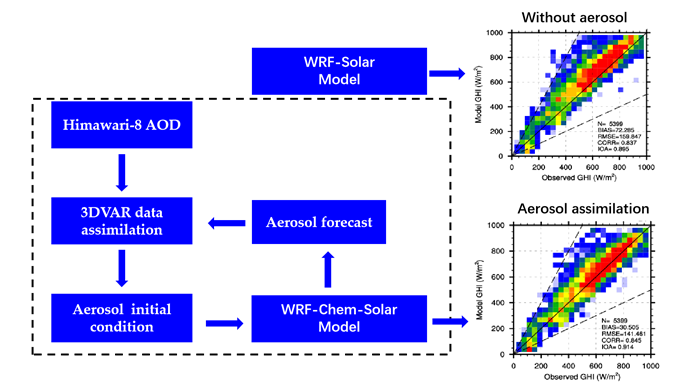搜索结果: 1-15 共查到“理学 WRF-Chem v. 3.4”相关记录17条 . 查询时间(0.096 秒)

A new chemistry option in WRF-Chem v. 3.4 for the simulation of direct and indirect aerosol effects using VBS:evaluation against IMPACT-EUCAARI data
WRF-Chem v. 3.4 direct and indirect aerosol VBS IMPACT-EUCAARI data
2015/9/10
A parameterization for secondary organic aerosol (SOA) production based on the volatility basis set (VBS) approach has been coupled with microphysics and radiative schemes in the Weather Research and ...
Evaluation of the high resolution WRF-Chem (v3.4.1) air quality forecast and its comparison with statistical ozone predictions
high resolution WRF-Chem air quality forecast statistical ozone predictions
2015/8/6
An integrated modelling system based on the regional online coupled meteorology–atmospheric chemistry WRF-Chem model configured with two nested domains with horizontal resolutions of 11.1 and 3.7 km h...
Twelve-month, 12 km resolution North American WRF-Chem v3.4 air quality simulation: performance evaluation
Horizontal resolution the simulation of the air pollution in the chemical chemical transfer mode the mechanism of atmospheric chemistry modal aerosol dynamics model
2015/5/18
We present results from and evaluate the performance of a 12-month, 12 km horizontal resolution year 2005 air pollution simulation for the contiguous United States using the WRF-Chem (Weather Research...
A new WRF-Chem treatment for studying regional-scale impacts of cloud processes on aerosol and trace gases in parameterized cumuli
regional-scale impacts new WRF-Chem treatment
2015/3/5
A new treatment of cloud effects on aerosol and
trace gases within parameterized shallow and deep convection, and aerosol effects on cloud droplet number, has been
implemented in the Weather Researc...
Implementation of aerosol assimilation in Gridpoint Statistical Interpolation (v. 3.2) and WRF-Chem (v. 3.4.1)
aerosol assimilation Gridpoint Statistical Interpolation WRF-Chem
2014/12/19
Gridpoint Statistical Interpolation (GSI) is an assimilation tool that is used at the National Centers for Environmental Prediction (NCEP) in operational weather forecasting in the USA. In this articl...
Gaseous chemistry and aerosol mechanism developments for version 3.5.1 of the online regional model, WRF-Chem
Gaseous chemistry aerosol mechanism developments
2014/12/19
We have made a number of developments to the Weather, Research and Forecasting model coupled with Chemistry (WRF-Chem), with the aim of improving model prediction of trace atmospheric gas-phase chemic...
Assessing the CAM5 physics suite in the WRF-Chem model: implementation, resolution sensitivity, and a first evaluation for a regional case study
CAM5 physics suite WRF-Chem model
2014/12/18
A suite of physical parameterizations (deep and
shallow convection, turbulent boundary layer, aerosols, cloud
microphysics, and cloud fraction) from the global climate
model Community Atmosphere Mo...
Inclusion of ash and SO2 emissions from volcanic eruptions in WRF-Chem: development and some applications
ash SO2 emissions volcanic eruptions WRF-Chem development some applications
2014/12/16
We describe a new functionality within the Weather Research and Forecasting (WRF) model with coupled Chemistry (WRF-Chem) that allows simulating emission, transport, dispersion, transformation and sed...
Simulations over South Asia using the Weather Research and Forecasting model with Chemistry (WRF-Chem): set-up and meteorological evaluation
Simulations over South Asia Weather Research Forecasting model Chemistry set-up meteorological evaluation
2014/12/11
The configuration and evaluation of the meteorology is presented for simulations over the South Asian region using the Weather Research and Forecasting model coupled with Chemistry (WRF-Chem). Tempera...
Simulations over South Asia using the Weather Research and Forecasting model with Chemistry (WRF-Chem): chemistry evaluation and initial results
Simulations over South Asia using the Weather Research Forecasting model Chemistry chemistry evaluation initial results
2014/12/10
This study presents annual simulations of tropospheric ozone and related species made for the first time using the WRF-Chem model over South Asia for the year 2008. The model-simulated ozone, CO, and ...
WRF-Chem modeling of sulfur dioxide emissions from the 2008 Kasatochi Volcano
WRF-Chem volcano sulfur dioxide model emissions
2015/8/18
We simulate the dispersion and chemical evolution of the sulfur dioxide (SO2) plume following the eruption of Kasatochi Volcano in Alaska, USA, on August 7th, 2008 with the Weather Research Forecastin...
Impact of model resolution on chemical ozone formation in Mexico City: application of the WRF-Chem model
model resolution chemical ozone formation Mexico City the WRF-Chem model
2010/10/11
The resolution of regional chemical/dynamical models has important effects on the calculation of the distributions of air pollutants in urban areas. In this study, the sensitivity of air pollutants an...
Technical Note: Evaluation of the WRF-Chem "Aerosol Chemical to Aerosol Optical Properties" Module using data from the MILAGRO campaign
the WRF-Chem "Aerosol Chemical to Aerosol Optical Properties" Module data the MILAGRO campaign
2010/8/16
A comparison between observed aerosol optical properties from the MILAGRO field campaign, which took place in the Mexico City Metropolitan Area (MCMA) during March 2006, and values simulated by the We...
Simulation of Mexico City plumes during the MIRAGE-Mex field campaign using the WRF-Chem model
Mexico City plumes MIRAGE-Mex field campaign WRF-Chem model
2009/7/22
The quantification of tropospheric O3 production in the downwind of the Mexico City plume is a major objective of the MIRAGE-Mex field campaign. We used a regional chemistry-transport model (WRF-Chem)...


